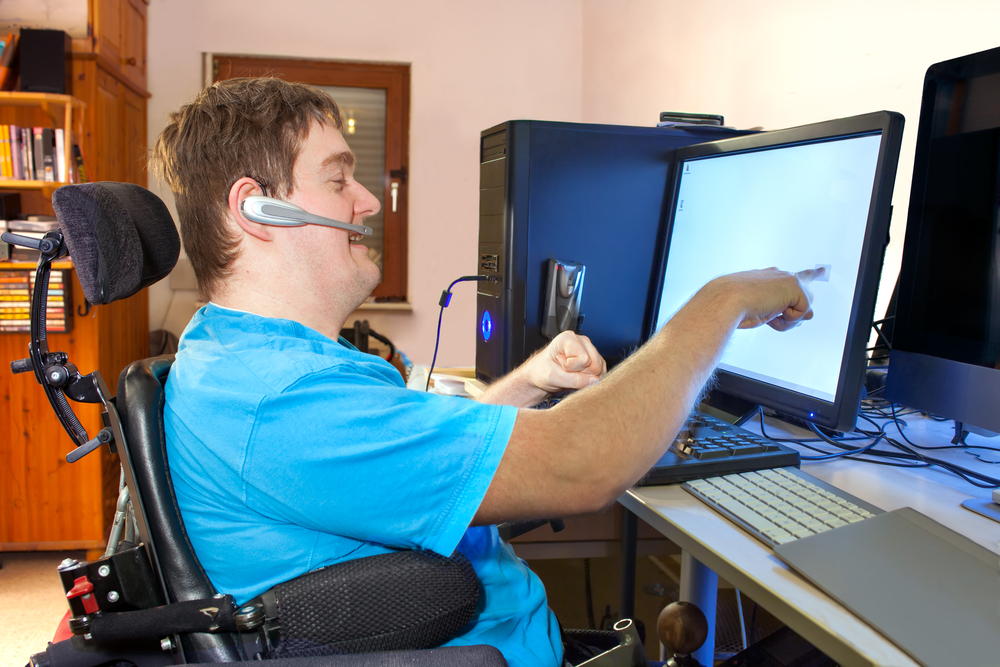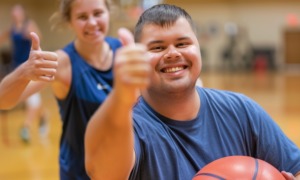Sean Gold, 23, well knows the hurdles people with disabilities face in exercising their voting rights.
“My mom, aunt and I were at the DMV,” said the St. Louis man, recalling the day five years ago when he signed up to cast his first vote. “I saw the forms on a shelf and I got one out as they were busy in line. My aunt came over and helped me. The only thing I could do was sign my name at the bottom.”

Courtesy of Sean Gold/Instagram
Sean Gold
Continued Gold, an author and disability rights advocate whose cerebral palsy causes severe spasms in his arms and legs: “We need better options to get people registered. It is not widely known that we can easily register to vote online.”
Online registration was among the expanded forms of voter access that several states implemented in 2020 at the height of the COVID-19 pandemic. That tool, vote-by-mail, early voting, curbside voting, electronic voting and related initiatives were an upshot of the pandemic for disabled voters, said Michelle Bishop, the National Disability Rights Network’s voter access engagement manager.
Yet, since then, she and other observers argue, voter-access progress has stalled in states where officials have sounded false alarms about election fraud, proposing or mandating restrictions on absentee voting, ballot drop-boxes and so forth. A New York University Brennan Center for Justice report details the rising tally of states doing everything from empowering lawmakers to remove nonpartisan election officials to blocking access to drop boxes to limiting mail-in voting.
Advocates for the nation’s estimated 41 million disabled people, or one in eight Americans, find those trends troublesome.
“In the disability community we’ve often seen that access is fine when it’s something that helps everyone. And, then, as soon as the general population is not interested anymore, those accommodations disappear,” said Gregg Beratan, co-founder and organizer with #Cripthevote.
After the 2020 election, a rising tide of voting restrictions
Since the 2020 presidential election, legislators in 43 states have introduced a total of more than 250 bills that the American Civil Liberties Union deems restrictive and cited in a July 2022 ACLU report. Several of those restrictions have become laws that, among other things, limit vote-by-mail, require proof of citizenship or impose stricter voter ID requirements.

Courtesy of Gregg Beratan
Gregg Beratan, co-founder and organizer with #Cripthevote.
Even before such efforts, the U.S. General Accounting Office had noted voting barriers that are violations of the Americans with Disabilities Act, commonly called the ADA. That federal agency’s 2017 analysis found that 60% of 178 — or 107 —polling places across the country had such impediments as steep outdoor entrance ramps, poor parking surfaces or lack of signage indicating paths for people with impaired mobility. Sixty-five percent of those polling places lacked wheelchair access and other accommodations for voters with disabilities. It wasn’t clear, according to the report, whether the ADA’s voter provisions applied to in-person voting before Election Day.
“We’ve seen a slew of bills all across the United States, some of which are great, some of which take those pro-voter policies and make them permanent, and some of which try to roll them back,” the disability rights network’s Bishop said, of the recent restrictions. “We probably won’t know until at least this midterm election — but maybe even through the 2024 election cycle — how that’s really all going to shake out.”
Her organization currently is keeping an eye on states like Alabama, which banned curbside voting; Texas and Wisconsin, which have tried to limit who can assist voters with disabilities; and Georgia, which has prohibited the delivery of water or food to people waiting in long lines to vote.
Blind and hearing-impaired voters still face barriers, despite better ballot-access
The recent expansion of voting access doesn’t address some particular, long-standing barriers. A deaf or hearing-impaired individual may not be able to communicate with poll workers and vice versa, said disability community organizer Sarah Blahovech, who also is a political consultant. People with a cognitive disability may not want to share that they need assistance, fearing they’ll be stigmatized, she explained.
 The General Accounting Office’s report did not specifically address what blind voters confront, said attorney Lou Ann Blake, who is visually impaired. Blake, the National Federation for the Blind’s research director, said blind voters need that are connected to headphones and a keypad, and turned on and working when voters arrive. For voters with low vision, the machines also have touch screens showing letters whose font size can be increased. But those accommodations often aren’t made.
The General Accounting Office’s report did not specifically address what blind voters confront, said attorney Lou Ann Blake, who is visually impaired. Blake, the National Federation for the Blind’s research director, said blind voters need that are connected to headphones and a keypad, and turned on and working when voters arrive. For voters with low vision, the machines also have touch screens showing letters whose font size can be increased. But those accommodations often aren’t made.
“Frequently, a quarter to a third of our survey respondents say that the machine has not been set up,” Blake said. “So, it’s a big problem.”
Too often, Blake added, blind people may not know how to use voting features designed for them or even be aware that they exist.
Also, fewer than 10 states allow electronic ballots that can be both accessed and returned online, Blake said. One of them, New York, last April settled a class-action lawsuit filed by several blind persons and advocacy organizations by agreeing to provide electronic voting for disabled people in that state. In 2020, 31 states offered electronic access but voters still had to print the ballot and mail it. If blind voters don’t have a printer, they might need assistance, which prevents them from voting privately and independently as the law requires.
Other challenges remain. For example, disabled people with legal guardians who make financial, health care and other decisions on their behalf automatically can be stripped of their right to vote as a part of that court-ordered guardianship.

Courtesy of Sarah Blahovec
Sarah Blahovec
“It can be really difficult to restore those rights,” said community organizer Blahovec, who previously was civic engagement and voting rights director for the National Council on Independent Living.
Voter registration and participation rates are lower for people with disabilities compared to the non-disabled but still significant: 70% of people with disabilities registered to vote in 2020, and 88 percent of those individuals voted, according to researchers at Rutgers University. Compared to the 2016 general election, the 2020 figure represented an increase in voter turnout, by 5.9 points, for people with disabilities. There was a 5.3-point increase among voters without disabilities during the same period.
Despite that heightened interest in voting and more voter access, 11% of voters with disabilities experienced difficulty voting in 2020, the Rutgers researchers wrote.
“The access to polling places is really an issue of systemic inaccessibility in society,” Blahovec said. “Our polling places are at places that are governed by the Americans with Disabilities Act. However, the ADA is not a magic wand. A lot of sites, even though they are under the law required to be accessible to people with disabilities, they never actually got there.”
Fights to expand access continue
U.S. Rep. Mary Gay Scanlon (D-Pennsylvania) can attest to the ADA’s insufficiency and its lack of enforcement. There’s been a long effort in her state to get a wheelchair ramp installed at Chester, Pa. post office that was built in 1937. “Wealthier districts have ramps but this place has been left behind,” she said, of that town of 33,000, mostly Black residents. According to the most recent Census data, 8.2% of residents of Chester County, which abuts Philadelphia, had a disability.
Scanlon sponsored HR 775, also known as the Disability Voting Rights Act, in 2021. It’s intended to provide more voting options for people with disabilities, including procedures for secure mail and electronic registration and voting. The bill was folded into a broader voter access measure, HR 1, also known as the For the People Act, and passed in the House of Representatives; it awaits action in the U.S. Senate.
Despite aging infrastructure like that Chester post office, Pennsylvania has made strides toward greater access with universal mail-in voting. Washington D.C. is another exemplary model, Blahovec said, offering all voters the opportunity to use an accessible voting machine or a paper ballot. The district also offers both electronic ballot delivery and return. “They are very proactive about their policies and making sure that they have policies that work for everyone,” she said. “It doesn’t seem to just be a disability thing.”
Three years after the General Accounting Office published its report on barriers to voting for disabled people, President Biden signed an executive order to promote access to voting. It led to another report, one by the National Institute of Standards and Technology, on access barriers for voters with disabilities. In addition to identifying systemic barriers to voting for people with disabilities, the 113-page report makes several recommendations to improve voter registration, vote-by-mail, voting systems, polling locations and poll worker training.
***
Freelance writer Ziba Kashef, author of four books, specializes in covering health, mental health, diversity and lifestyle topics.






























